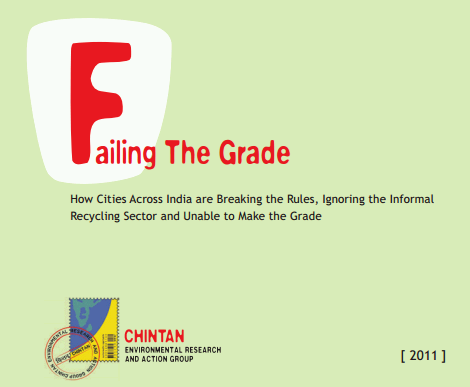September 28, 2012
 On the road to Zero Waste: waste pickers as main actors
On the road to Zero Waste: waste pickers as main actors
GAIA has recently launched the publication, “On The Road to Zero Waste: Successes and Lessons from around the World. Stories from nine different countries show us that zero waste is a revolution in the relationship between waste and people. It is a new way of thinking that aims to safeguard the health and improve the lives of everyone who produces, handles, works with, or is affected by waste—in other words, all of us.
As part of the impressive research completed for the release of this publication, the authors naturally found waste pickers’ cases to be described and shared… no wonder! They are a fundamental part of any responsible waste management proposal that intends to reduce, reuse and recycle in the developing countries of the world.
It is the case of Pune, Mumbai, Buenos Aires. In Pune, India, a door-to-door collection service operated by a cooperative of almost 2,000 grassroots recyclers has been integrated into the city’s waste management system and diverts enough waste to avoid 640,000 tons of greenhouse gas emissions annually.
In Mumbai, India, a focus on organics has produced real value from their largest and most problematic portion of municipal waste. Stree Mukti Sanghatana (SMS), a non-governmental organization, has successfully demonstrated the viability of decentralized waste management in one of the world’s largest and most crowded cities. Although this approach takes more time to roll out than a one-size-fits-all city-wide strategy, its greater flexibility and customization is important to its success. Waste picker cooperatives are instrumental in managing source separation, and small-scale biogas and compost pits have generated higher-paying employment for women waste pickers while significantly reducing the waste burden on the municipality.
In Buenos Aires, Argentina, by organizing into cooperatives and taking collective political action, grassroots recyclers called cartoneros have gotten the city to adopt separation of waste at source, an essential step toward its goal of 75 percent diversion by 2017.
The stories of these communities and others are detailed in the report. While few locations are bringing together all the elements of a comprehensive zero waste plan, many have in common a philosophy driven by four core strategies: setting a new direction away from waste disposal, supporting comprehensive reuse, recycling, and organics treatment programs, engaging communities, designing for the future. Once communities begin to put zero waste practices in place, new opportunities emerge. Waste pickers know that. Zero waste is ambitious, but it is neither unachievable nor part of some far-off future. In small towns and big cities, in communities rich and poor, in the global North and South, innovative plans in place today are making real progress toward the goal of zero waste.
 Global Strategic Workshop Report (August 2012).
Global Strategic Workshop Report (August 2012).
From April 27-29, waste pickers from Asia, Africa, Latin America and Europe participated in the First Global Strategic Workshop in Pune, India . This workshop was hosted by KKPKP, a trade union of waste pickers in Pune, and SWaCH on behalf of the Global Alliance of Waste Pickers, with support from WIEGO and the Inclusive Cities project.
 Failing the Grade – Chintan (August 2012)
Failing the Grade – Chintan (August 2012)
Indian policies and rules, while not perfect, have some important safeguards and recognition for waste pickers. However, municipalities, urban policy makers, and private companies ignore them while conducting business in solid waste management. In so doing, they bypass the environment and the poor. In this context, most formal players, both state actors and non-state actors, fail the grade. No single city has fully and comprehensively implemented all the rules and followed the spirit of the policies laid out for waste pickers and other informal sector actors in India.
Tweet

